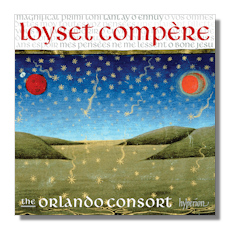
The Internet's Premier Classical Music Source
Related Links
-
Compère Reviews
- Latest Reviews
- More Reviews
-
By Composer
-
Collections
DVD & Blu-ray
Books
Concert Reviews
Articles/Interviews
Software
Audio
Search Amazon
Recommended Links
Site News
 CD Review
CD Review
Loyset Compère

Magnificat, Motets & Chansons
- Magnificat primi toni
- Tant ay d'ennuy/O vos omnes
- Dictes moy toutes voz pensées
- Une plaisant fillette ung matin se leva
- Vous me faites morir d'envie
- Ung franc archier, Ung franc taulpin qui sur les champs alloit
- Ne doibt on prendre quant on donne
- Au travail suis sans espoir de confort
- Mes pensées ne me lessent une heure
- O bone Jesu
The Orlando Consort
Hyperion CDA68069 68:22
The Orlando Consort was formed as long ago as 1988 by the Early Music Network of Great Britain to perform music from the mid-eleventh to mid-sixteenth centuries. Informed by scholarship, their performances have been of a consistently high standard. Here is their second CD devoted solely to the music of Loyset Compère (the first, from 20 years ago, is no longer available). Recorded in September 2013, it contains a representative sample of ten of his vocal works ranging in length from under three to over twelve minutes… the splendid Magnificat primi toni [tr.1] makes a huge impact at the start of the CD, and is the longest work here.
The precision of the articulation and enunciation of Orlando Consort members, Matthew Venner countertenor, Angus Smith and Mark Dobell tenors and Donald Greig baritone, is excellent. Never fussy. Nor yet "passive", the four singers present the music as it must surely have been intended to be heard. There is a simplicity (without plainness) and openness to each of the movements, for instance, of that splendid Magnificat which quietly contribute to our appreciation of its monumental stature. Dignified, not stolid and colorful, not over bright.
As you get to know the other works here, possible aspects of the composer's personality emerge… confidence, quiet humility and a passion that never reached the torrid. The music never exists for showiness. Nor for its own sake; that is, Loyset Compère isn't interested in embellishing, "playing", ornamenting for effect. Yet nowhere on this CD is there plainness or routine. The Orlando Consort approaches such a balance very successfully. Their sense of tempo, use of pauses, silences and variation in dynamic are in total accord with the purpose of the music, the sense of a fifteenth century Flemish composer's and performer's devotion and belief. It's also a balance between lack of doubt and a quiet knowledge of inevitable impermanence. On the other hand, the singers never add qualities of a twentieth/twenty-first century metaphysic. The music as music is prime.
The first official records of Loyset's (a diminutive of Louis) work relate to his time at the Sforza court chapel in Milan (from 1474 to 1477), for which the Magnificat was written. After Duke Galeazzo Maria Sforza's murder in 1476, we know little of Compère until he is recorded as being back in France a good decade later, where he almost certainly wrote Vous me faites [tr.5], Ne doibt on prendre [tr.7], Dictes moy [tr.3] and the other most substantial work here, Mes pensées [tr.9].
These are all in three voices and display an intense fascination with structure… imitation, balance between vocal lines and tessiture, the transformation of motifs, and counterpoint. They are also examples of the formes fixes so important in French song for nearly two centuries but beginning to decline by this time (the 1480s); Josquin and Obrecht wrote next to nothing for the genre, leaving only Agricola with Compère as their last exponents.
The strophic four-voice songs, on the other hand (Ung franc archier [tr.6], Une plaisant fillette [tr.4]) are freer, more declamatory and almost exploratory. It's highly likely that they're from a later period. Harder to date accurately are the final two songs included here, Au travail [tr.8] and Tant ay [tr.2]. They could well be the earliest of them all, although the latter comes down in manuscripts from the mid-1490s. Although he lived until 1518, the majority of Compère's work dates from between 1465 and 1500.
This selection, then, presents a useful variety of music illustrating the breadth of the composer's output, his development, and confidence in several (contrasting) genres. It is to the singers' great credit that they project the beauty and depth of the music across these spans. Their singing is idiomatic without being familiar; it's at ease without being either pompous or really relaxed. Underpinning their delivery throughout, there is a mix between what was classical, accepted and (as said) waning in style during Compère's lifetime on the one hand. Yet vibrant, exciting and excitedly alive on the other.
Ultimately it's the tightness, the precision, the lack of latitude, inappropriate romanticism and sense of purpose that distinguishes these excellent performances. And yet they're strangely full of warmth; they're made approachable and of course immensely enjoyable by the singers. The Consort understands that the music is of sufficient quality to speak for itself. Their style conveys its freshness, power and the directness between purpose and fulfilment. Admirable in all ways.
The acoustic (of the church of St John the Baptist, Loughton, in Essex) is almost subdued. Calm and calming, certainly. It enhances the understated delivery of the Orlando Consort very well. The recording is miked closely and the singers' voices all clear and clean as a result. The booklet has a brief but useful essay by David Fallows setting the scene; it contains text in French and Latin with English. Even were only Dictes moy toutes vos pensees and O bone Jesu not the only works on this CD currently available elsewhere, it would be one to recommend without hesitation. Lovers of the repertoire and Loyset in particular are well served here by the ever-enterprising Hyperion.
Copyright © 2015, Mark Sealey





















